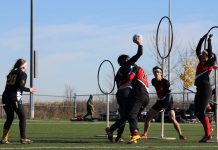“Slava Ukraini!” This phrase has been chanted on the frontlines of war, by military personnel and civilians, on the news, and in rallies for Ukraine in Kitchener-Waterloo. Its translation: “Glory to Ukraine!”
It’s a short and powerful saying — one the Ukrainian people have been continuously acting on since Russia launched its full-scale invasion of Ukraine on Feb. 24, 2022. The one year commemoration of war in Ukraine was observed globally on Feb. 24, 2023.
In the past 365 days, over 17 million Ukrainians have been displaced, Russia has launched over 4,700 missiles at Ukraine, and tens of millions of people are at risk of death.
As the fighting continues, civilians live and die along the frontlines. Schools have been destroyed, education has been disrupted, culture has been threatened, and artifacts stolen. Housing and infrastructure loss continues to soar, and medical services are overwhelmed. The economic impact of the war is devastating.
Antonina Rudakova left Ukraine in May 2022. “It’s always scary to leave home and face something new, but it was even scarier for me to stay with a feeling of uncertainty about the next day. Leaving family, relatives, and loved ones for the sake of the unknown was our price for safety and the future,” said the master’s student. “We didn’t know what we would encounter on the other side of the world, but we are very happy to be here in this environment filled with support from all sides.”
Here in Waterloo, Rudakova and fellow Ukrainian students are working to connect with and educate the UW community about the reality of what is happening.
They have created a migrating art exhibition on the war in Ukraine. After seven months of touring the campus with the exhibit, they have shown their work in every faculty and reached the majority of the UW community.
“Organizing presentations of this exhibition at each faculty, using VR tools to show Ukraine before the full-scale war and after the Russian invasion, sharing Ukrainian treats, allowing our guests to experience how Ukraine sounds now, and even showing some artifacts from the battlefield we were able to make deep interaction with our University community and show how life in Ukraine looks like now,” said Halyna Padalko, a Ukrainian student pursuing a master’s in global governance.
Through photographs and stories shared by students, it is clear Russia has used several methods to try and make living in the territory that is historically Ukrainian near impossible.
The main approach has been putting Ukrainian’s life and health directly at risk through military attacks. 97 per cent of Russian attacks have been on civilian targets. As of Jan. 30, 18,817 civilian casualties with 7,155 confirmed deaths were recorded by the United Nations in unoccupied territories. There is no confirmation yet on the number of deaths and casualties in occupied territories.
As a result of the bombing and attacks, 74.1 million square metres of housing and apartments have been damaged or destroyed. 126.7 thousand homes and 16.8 thousand residential buildings have been affected, amounting to a $52.5 billion loss.
Medical aid has also been a target of attacks. By Aug. 28, 2022, 927 healthcare buildings had been damaged or destroyed according to the Ministry of Health in Ukraine. It is estimated $1 billion CAD is required to rebuild lost healthcare infrastructure.
Along with people and infrastructure, Ukrainian culture is under attack. The targeted erasure of heritage and culture by the Russian army is meant to diminish the spirit of Ukranians and destroy Ukrainian legacies for future generations. The Ministry of Culture and Informational Policy in Ukraine has been recording the damage and loss of culturally significant objects. A recorded 1,271 objects, not including heritage sites, have been damaged as of Jan. 25, 2023.
Educational institutions have suffered from bombing and shelling. The destruction of buildings is only one threat to education in Ukraine. Assimilation policies are implemented in Russian occupied territories to further erase the identity of Ukrainian people. This identity is being fought for in Ukraine and by those displaced globally. At Waterloo, the Ukrainian students joined the University for Ukraine (U4U) organization.
“I’ve spoken to several students, colleagues and friends who ask how they can help Ukrainians in a meaningful way,” said Serhiy Yarusevych, a Ukrainian-Canadian mechanical and mechatronics engineering professor at UW and U4U co-founder, in an interview with Waterloo News.
“That’s where the idea for U4U began — to provide every person on campus a quick and easy way to make a difference in the lives of Ukrainians shattered by war.”
They collected more than $8,000 CAD for Ukrainian humanitarian aid.
The University of Waterloo Ukrainian Association (UWUA) was started several weeks ago.
“We created UWUA to promote Ukrainian culture and its rich heritage. In these challenging times, we want to amplify the voices coming from Ukraine and raise awareness of the war,” said Sofiia Mudra, UWUA co-president. “UWUA also unites Ukrainian students and offers a supportive community away from home. Through a variety of activities, we aim to enrich the student life at the University of Waterloo and we invite everyone to join our club.”
Reflecting on what has happened over a year of war, the strength of the Ukrainian people is evident. On Feb. 24, a candlelit vigil was held in Kitchener in solidarity with Ukraine for 365 days of resistance.
“We are extremely grateful to the University community for helping us raise awareness about war and Ukraine. We want to thank all faculties for joining our exhibition and promotion of Ukraine. We aimed to show our resilience and resistance. I think together we have done a great job,” Padalko expressed.
Heroyam slava, “Glory to heroes.”































